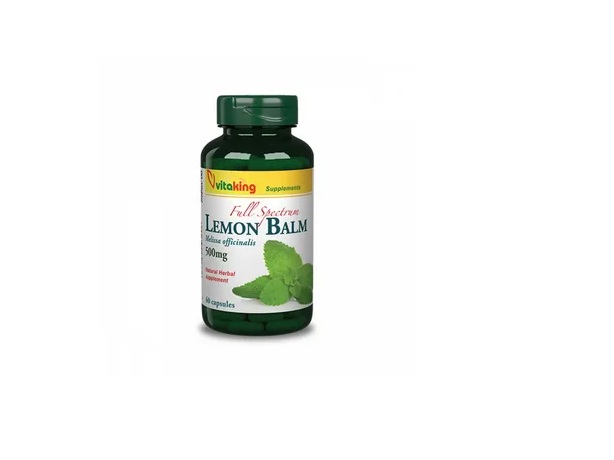
Benefits of Lemon Balm Supplements
- by Barbara Santini
- Posted on March 23, 2024
Lemon balm (Melissa officinalis), a perennial herb from the mint family, has been esteemed for its medicinal properties since ancient times. Known for its lemon-scented leaves, lemon balm has found its way into both culinary and traditional medicine practices across the world, particularly in Europe and the Mediterranean. Today, lemon balm supplements, available in forms such as capsules, teas, extracts, and oils, are utilized for their wide range of health benefits. This guide aims to provide a comprehensive overview of the benefits associated with lemon balm supplements, backed by scientific findings and historical usage.
Stress and Anxiety Reduction
One of the most celebrated benefits of lemon balm is its ability to alleviate stress and anxiety. Research indicates that lemon balm contains compounds that have a calming effect on the nervous system. These effects are attributed to the herb’s ability to inhibit the enzyme GABA transaminase, which breaks down gamma-aminobutyric acid (GABA), a neurotransmitter that promotes relaxation. By increasing GABA activity, lemon balm can help reduce symptoms of anxiety and promote a sense of calmness. Clinical trials have shown that supplements containing lemon balm not only reduce anxiety levels but also lower stress-induced insomnia.
Cognitive Function and Memory
Lemon balm supplements have also been shown to enhance cognitive function and memory. This is particularly beneficial in the context of aging and cognitive decline. The herb’s antioxidant properties protect brain cells from oxidative stress and improve neural function, which in turn enhances memory and cognitive agility. Studies involving participants with mild cognitive impairment observed improvements in memory and attention tasks after regular intake of lemon balm extract, suggesting its potential as a supportive treatment in conditions like Alzheimer’s disease.
Sleep Quality
Closely related to its effects on stress and anxiety, lemon balm can significantly improve sleep quality. Its sedative properties, owing to the enhancement of GABA in the brain, can help shorten the time it takes to fall asleep and increase the duration of sleep, making it a natural remedy for insomnia and sleep disturbances. Unlike prescription sleep medications, lemon balm does not induce grogginess or dependency, making it a safer alternative for long-term use.
Digestive Health
Lemon balm has a long history of use in relieving digestive ailments, such as indigestion, bloating, and gas. The herb’s antispasmodic properties relax the muscles of the digestive tract, easing cramps and spasms that can cause discomfort. Furthermore, its antibacterial and anti-inflammatory effects can help manage conditions like irritable bowel syndrome (IBS), by reducing inflammation and combating harmful bacteria in the gut.
Herpes Virus and Cold Sores
Topical application of lemon balm extract has been found to be effective in the treatment of herpes simplex virus (HSV) infections, which cause cold sores. Lemon balm’s antiviral properties inhibit the penetration and spread of the virus, speeding up the healing process of cold sores and reducing their recurrence. Regular application of lemon balm cream or ointment to affected areas has demonstrated a significant reduction in the duration and severity of outbreaks.
Heart Health
Emerging research suggests that lemon balm may have beneficial effects on heart health. Its antioxidant properties help to protect against heart disease by reducing oxidative stress and inflammation, two key factors in the development of cardiovascular conditions. Additionally, lemon balm has been shown to lower high blood pressure, a major risk factor for heart disease, by relaxing the blood vessels and improving circulation.
Antioxidant and Anti-inflammatory Effects
The numerous health benefits of lemon balm are supported by its strong antioxidant and anti-inflammatory properties. These properties help combat oxidative stress and inflammation in the body, which are linked to a multitude of chronic diseases, including heart disease, cancer, and diabetes. By neutralizing free radicals and reducing inflammation, lemon balm supplements can contribute to overall health and disease prevention.
Precautions and Side Effects
Although lemon balm is generally considered safe for most people, it can cause side effects in some cases. These may include increased appetite, nausea, dizziness, and allergic reactions. Due to its sedative effects, lemon balm should be used with caution when taking sedatives or medications that affect the central nervous system. Pregnant and breastfeeding women should consult a healthcare provider before using lemon balm supplements.
In conclusion
lemon balm supplements offer a natural, effective way to improve mental health, enhance cognitive function, support digestive health, and contribute to overall well-being. Its calming effects on the nervous system, coupled with its antioxidant and anti-inflammatory properties, make lemon balm a valuable herb in the prevention and management of various health conditions. As with any supplement, it’s important to approach the use of lemon balm with mindfulness, paying attention to dosages and potential interactions with other medications. By incorporating lemon balm into a holistic approach to health, individuals can harness the therapeutic benefits of this ancient herb to enhance their quality of life.
Barbara is a freelance writer and a sex and relationships adviser at Dimepiece LA and Peaches and Screams. Barbara is involved in various educational initiatives aimed at making sex advice more accessible to everyone and breaking stigmas around sex across various cultural communities. In her spare time, Barbara enjoys trawling through vintage markets in Brick Lane, exploring new places, painting and reading.
[email protected]
- Exploring Just Kratom Capsules: My Top Picks and Honest Reviews of Every Strain - August 29, 2024
- Craftsman Series by Vessel: Stylish Vape Pens Reviewed from a User’s Perspective! - August 1, 2024
- Benefits of Eucalyptus Supplements - April 1, 2024
Lemon balm (Melissa officinalis), a perennial herb from the mint family, has been esteemed for its medicinal properties since ancient times. Known for its lemon-scented leaves, lemon balm has found its way into both culinary and traditional medicine practices across the world, particularly in Europe and the Mediterranean. Today, lemon balm supplements, available in forms…
